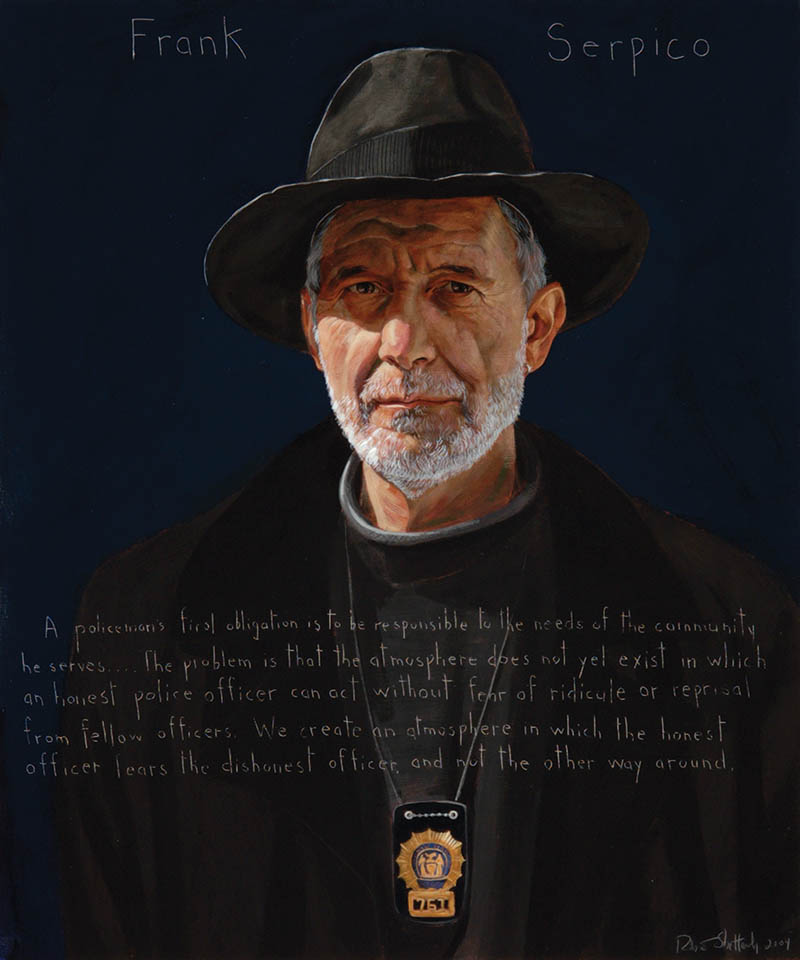
Frank Serpico
Retired Police Detective, Author, Lecturer : b. 1936
“A policeman’s first obligation is to be responsible to the needs of the community he serves…The problem is that the atmosphere does not yet exist in which an honest police officer can act without fear of ridicule or reprisal from fellow officers. We create an atmosphere in which the honest officer fears the dishonest officer, and not the other way around.”
Biography
1971: Became the first New York City policeman in history to testify about widespread corruption in the department.
1972: Received the NYPD’s higest award, The Medal of Honor.
After being shot and testifying about corruption in the NYPD, Serpico lived in Europe for nearly a decade.
Al Pacino played Serpico in the 1973 movie about his life.
Frank Serpico was born in Brooklyn, New York. When he was eighteen, he enlisted in the U.S. Army and served for two years in Korea. After military service, he worked part-time and attended college, joining the New York City Police Department at the age of twenty-three. His police career has been well-documented in Peter Maas’s best-selling biography and in the Academy Award nominated film, Serpico, in which Al Pacino portrayed him.
Serpico’s career as a plainclothes police detective working in Brooklyn and the Bronx to expose vice racketeering was short-lived, however, because he swam against the tide of corruption that engulfed the NYPD during the late sixties and early seventies. Not only did he consistently refuse to take bribes for “looking the other way,” he risked his own safety to expose those who did. In 1967 he reported to appropriate officials “credible evidence of widespread, systemic police corruption.” It was not until April 1970, however, when the New York Times published an explosive story, that Mayor Lindsay took action and appointed the Knapp Commission to investigate. As a consequence of his testimony before the commission, Serpico was ostracized by his peers and, many believe, ultimately “set up” to be shot during a drug raid in which he was seriously wounded and his fellow officers did not call for assistance.
He resigned from the NYPD and spent the next ten years living abroad, recovering from his wounds, traveling and learning. In the early eighties he settled in New York State.
Serpico continues to speak out against both the weakening of civil liberties and corrupt practices in law enforcement, such as the attempted cover-up following the Amadou Diallo shooting in 1999. He provides support for “individuals who seek truth and justice even in the face of great personal risk.” He calls them “lamp lighters,” a term he prefers to the more common “whistleblowers,” because it evokes memories of the historic ride in which Paul Revere made a great deal of noise and caused the lanterns to be lit.
Programs
Americans Who Tell the Truth (AWTT) offers a variety of ways to engage with its portraits and portrait subjects. Host an exhibit, use our free lesson plans and educational programs, or engage with a member of the AWTT team or portrait subjects.

Education
AWTT has educational materials and lesson plans that ask students to grapple with truth, justice, and freedom.

Exhibits & Community Engagement
AWTT encourages community engagement programs and exhibits accompanied by public events that stimulate dialogue around citizenship, education, and activism.